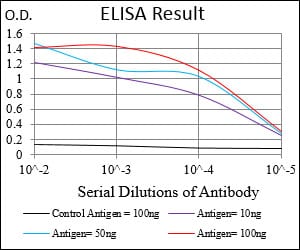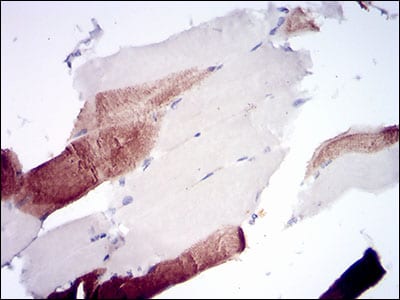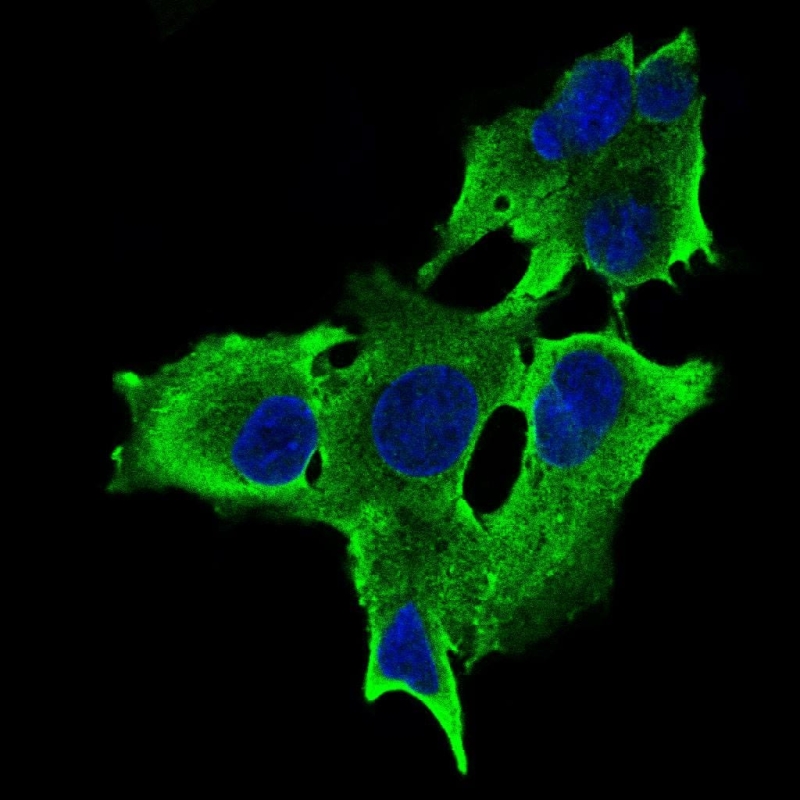


| WB | 咨询技术 | Human,Mouse,Rat |
| IF | 咨询技术 | Human,Mouse,Rat |
| IHC | 1/200 - 1/1000 | Human,Mouse,Rat |
| ICC | 1/200 - 1/1000 | Human,Mouse,Rat |
| FCM | 咨询技术 | Human,Mouse,Rat |
| Elisa | 1/10000 | Human,Mouse,Rat |
| Aliases | KOG1; Mip1 |
| Entrez GeneID | 57521 |
| clone | 5A3A4 |
| WB Predicted band size | 149kDa |
| Host/Isotype | Mouse IgG1 |
| Antibody Type | Primary antibody |
| Storage | Store at 4°C short term. Aliquot and store at -20°C long term. Avoid freeze/thaw cycles. |
| Species Reactivity | Human |
| Immunogen | Purified recombinant fragment of human RPTOR (AA: 874-1009) expressed in E. Coli. |
| Formulation | Purified antibody in PBS with 0.05% sodium azide. |
+ +
以下是3-4篇关于RPTOR抗体的参考文献,按文献名称、作者和摘要内容概括整理:
1. **文献名称**:*Rictor, a novel binding partner of mTOR, defines a rapamycin-insensitive and raptor-independent pathway that regulates the cytoskeleton*
**作者**:Sarbassov, D.D. et al. (2004)
**摘要**:研究首次发现RPTOR(raptor)与mTOR形成复合物(mTORC1),并利用特异性抗体验证其在调控细胞生长中的作用。抗体用于免疫共沉淀实验,揭示RPTOR在营养信号传导中的关键功能。
2. **文献名称**:*PRAS40 regulates mTORC1 kinase activity by functioning as a direct inhibitor of substrate binding*
**作者**:Sancak, Y. et al. (2007)
**摘要**:通过RPTOR抗体进行免疫印迹(Western blot)和免疫荧光分析,证明PRAS40通过结合RPTOR抑制mTORC1活性,揭示其在能量应激条件下的调控机制。
3. **文献名称**:*Raptor, a binding partner of target of rapamycin (TOR), mediates TOR action in cells*
**作者**:Hara, K. et al. (2002)
**摘要**:早期研究利用RPTOR抗体验证其在mTOR复合物中的结构作用,发现RPTOR缺失导致mTOR底物(如S6K1)磷酸化水平下降,证实其对mTORC1功能不可或缺。
4. **文献名称**:*mTOR interacts with raptor to form a nutrient-sensitive complex that signals to the cell growth machinery*
**作者**:Kim, D.H. et al. (2002)
**摘要**:通过RPTOR特异性抗体进行免疫沉淀实验,证明RPTOR-mTOR复合物对氨基酸和生长因子敏感,调控蛋白质合成和细胞增殖。
这些文献均通过RPTOR抗体在分子机制研究中验证其功能,涵盖免疫沉淀、Western blot和复合物分析等实验方法。
The RPTOR (Regulatory-Associated Protein of mTOR) antibody is a crucial tool in studying the mechanistic target of rapamycin (mTOR) signaling pathway, which regulates cell growth, proliferation, and metabolism. RPTOR, a core component of mTOR complex 1 (mTORC1), acts as a scaffold protein that recruits substrates and facilitates mTORC1 activation in response to nutrients, growth factors, and cellular energy status. Dysregulation of RPTOR-mediated mTORC1 signaling is implicated in cancer, metabolic disorders, and aging.
The RPTOR antibody enables researchers to detect and quantify RPTOR protein expression levels, assess its post-translational modifications (e.g., phosphorylation), and investigate its subcellular localization. It is widely used in techniques like Western blotting, immunoprecipitation, and immunofluorescence. Specific RPTOR antibodies are validated for species cross-reactivity (e.g., human, mouse, rat) and tested for specificity using knockout controls to minimize off-target signals.
In research, this antibody aids in exploring mTORC1's role in diseases, drug discovery (e.g., mTOR inhibitors), and mechanistic studies of nutrient-sensing pathways. For example, it helps evaluate RPTOR expression changes under conditions like starvation, growth factor stimulation, or pharmacological inhibition. Its application extends to cancer biology, where mTORC1 hyperactivation is common, and to metabolic studies linking RPTOR to insulin signaling and autophagy regulation. Validation data, including molecular weight confirmation (~150 kDa) and functional assays, are critical for ensuring experimental reliability.
×